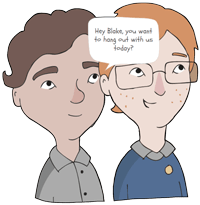- December 02, 2016
- By Chris Carroll
A new student sits alone by the wall during recess after others rebuff his attempt to play with them.
A girl with an Aboriginal background wants to join in a dance exhibition at school, but another child says her people dance strangely.
A youth pick-up soccer game excludes one would-be player—because she’s a girl.
Those are several of the scenarios in a new app for 7-to 11-year-olds that Melanie Killen, a UMD developmental science professor, and her research team designed in conjunction with researchers in Australia to help children accept peers who don’t seem part of the “in” group.
The project measures children’s stereotypes and biases using an iPad mobile app. The technology provides a new way to investigate children’s judgments, including their unconscious biases, as well as their motivation to stand up to group norms that exclude peers based on race, ethnicity, gender or other characteristics.
“What’s really fundamental to this is the notion of cross-race or cross-group friendship, which is the No. 1 predictor… for reducing prejudice,” says Killen, who has studied implicit bias, prejudice and moral cognition around the world. “That’s because if you have friends of a different race, it helps you challenge stereotypes.”
Development of the animated app—which can run on phones, tablets or computers—was funded by the Australian anti-racism charity All Together Now. Elementary schools Down Under rolled it out in early October.
Teachers guide children through eight lessons that center on choices about including or excluding other children who seem different. Children type short answers about why they made the choice they did, and how it likely made the included or excluded child feel.
 Killen and her team of researchers have started developing an adaptation for U.S. elementary students, and plan to conduct an intervention study with students in the Washington, D.C., area in the next year, she says.
Killen and her team of researchers have started developing an adaptation for U.S. elementary students, and plan to conduct an intervention study with students in the Washington, D.C., area in the next year, she says.
In addition to teaching tolerance and diversity, the app gathers anonymous data from responses that can be used for further research.
“What’s unique about this tool is that it’s an intervention, but it’s also a diagnostic tool,” Killen says, that will provide deeper understanding into the development of childhood prejudice and racism.
